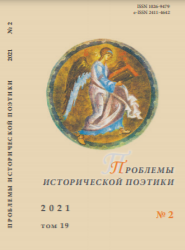Мотив блудного сына в сюжете романа И. А. Бунина «Жизнь Арсеньева»
The Motif of the Prodigal Son in the Plot of Ivan Bunin’s Novel The Life of Arseniev
Author(s): Tatiana N. KovalevaSubject(s): Christian Theology and Religion, Studies of Literature, Recent History (1900 till today), Russian Literature, 19th Century
Published by: Петрозаводский государственный университет
Keywords: Ivan A. Bunin; “The Life of Arseniev”; Gospel parable; plot; motif; prodigal son; dissolute life; repentance; resurrection; return to the Home of the Heavenly Father;
Summary/Abstract: The article is devoted to the research of the reception and transformation of the subject of the Gospel Parable of the Prodigal Son in the novel The Life of Arseniev by Ivan Bunin. The key events in the Parable of the Prodigal Son are present in the structure of The Life of Arseniev: leaving the ancestral home - leaving God behind; temptations of the spirit and flesh, dissolute life, spiritual lust, spiritual death; confession; return to the ancestral home - return to God, to the Heavenly Father’s Home. Arseniev’s departure from his ancestral home differs from the departure of the Gospel Parable’s hero, yet this event is one of the landmarks in the main character’s life path of life. Unlike the prodigal son, Aleksey Arseniev leaves his home seeking the highest meaning and purpose of life as the key aim; the sense of God’s presence had been present in his soul since his very childhood. However, the youthful thirst for glory and pleasures of life led Bunin’s hero to the abandonment of the Heavenly Father and to immersion in sinful life. The tropes of sensuality, temptation, desire, degradation, sins, unfaithfulness, adultery are the key motifs in the description of the hero’s dissolute life. Arsenyev’s immoral life became the main reason for the damage to his relationship with Lika and her breakup with him. The most important events in the Gospel Parable of the Prodigal Son are repentance of sins, penance before his father and before God - these events appear in Bunin’s novel in an altered form. Since Arseniev did not experience deep repentance before God for his sinful youth, the resurrection of his soul and his return to the Home of the Heavenly Father were impossible. Bunin demonstrates that an entire life is required for the hero to experience true repentance and his final return to God, thus Bunin leaves Arseniev on the path to God. Scenes from the Gospel Parable of the Prodigal Son, such as departure from the ancestral home, dissolute life and spiritual death are recreated most completely in Bunin’s novel The Life of Arseniev; while repentance and return to God, which take up the remainder of the hero’s life, are described by the author in a complex altered form.
Journal: Проблемы исторической поэтики
- Issue Year: 19/2021
- Issue No: 2
- Page Range: 301-325
- Page Count: 25
- Language: Russian

